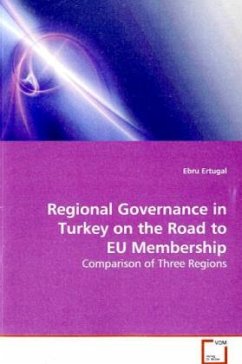In the last decades across many parts of Europe a
regional level of governance has been emerging, a
trend which has not been observed in Turkey despite
its extreme regional disparities. Since the Helsinki
summit of the EU leaders in 1999 when Turkey was
admitted as a candidate country, EU conditionality
has been increasingly challenging Turkey's
centralised territorial governance. This
book has two overall aims. First, it aims to identify
the key mechanisms through which institutional
stability has been sustained over time hindering the
emergence of a level of regional governance in
Turkey. Second, it examines whether and the
ways in which EU conditionality and/or
policy-learning is leading to institutional change
in the current period through a comparative study of
three regions in Turkey. This book addresses the gap
in literature on institutional capacity at the
regional level in Turkey and on the attitudes of
local and regional actors in Turkey to the issue of
regional governance and the EU. The analysis in this
book should be useful to professionals and regional
policy practitioners.
regional level of governance has been emerging, a
trend which has not been observed in Turkey despite
its extreme regional disparities. Since the Helsinki
summit of the EU leaders in 1999 when Turkey was
admitted as a candidate country, EU conditionality
has been increasingly challenging Turkey's
centralised territorial governance. This
book has two overall aims. First, it aims to identify
the key mechanisms through which institutional
stability has been sustained over time hindering the
emergence of a level of regional governance in
Turkey. Second, it examines whether and the
ways in which EU conditionality and/or
policy-learning is leading to institutional change
in the current period through a comparative study of
three regions in Turkey. This book addresses the gap
in literature on institutional capacity at the
regional level in Turkey and on the attitudes of
local and regional actors in Turkey to the issue of
regional governance and the EU. The analysis in this
book should be useful to professionals and regional
policy practitioners.








